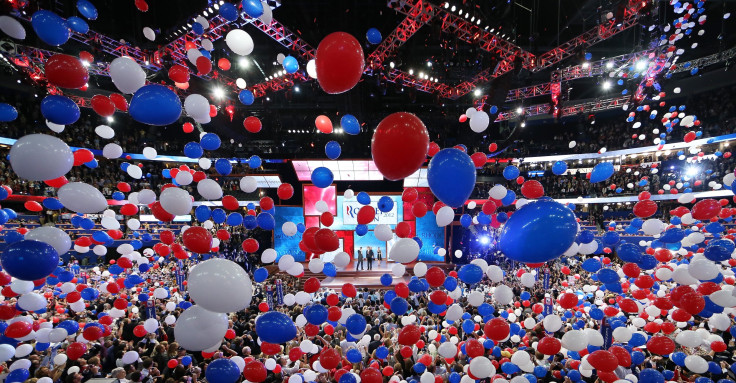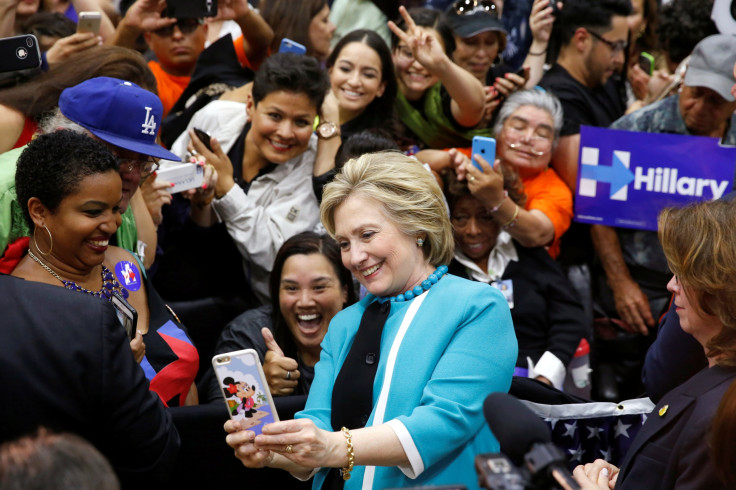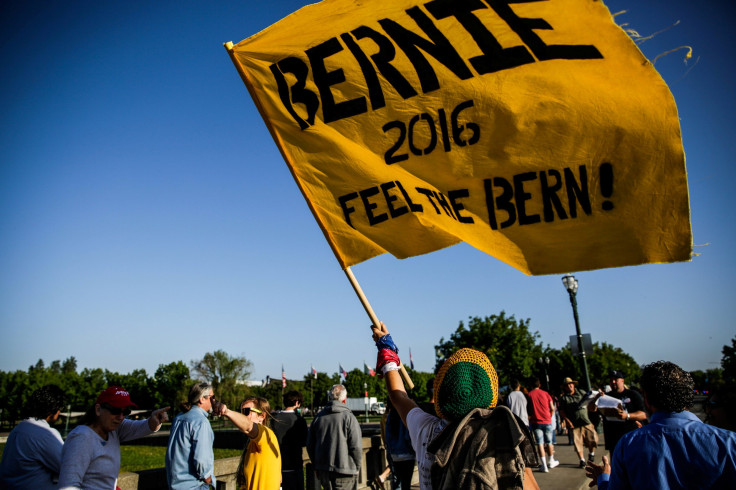Why Will Superdelegates Decide The 2016 Democratic Primary? Unearthed Documents Hold The Key

How democratic is the Democratic Party? Thanks to the pivotal role of unelected “superdelegates” in the party's nomination process, the question has dogged both Democratic officials and likely nominee Hillary Clinton for months.
That’s because superdelegates hold the balance of power in this year’s nomination. Among pledged delegates — meaning those who are elected by the voters through state primary and caucuses — Clinton leads her opponent Sen. Bernie Sanders by fewer than 300 votes. But that doesn’t include the party’s overwhelmingly pro-Clinton superdelegates, an agglomeration of elected officials, Democratic strategists, and various other functionaries who can vote at their own discretion. If a majority of the 719 superdelegates moved into the Sanders camp, he would be the undisputed nominee.
Many Sanders backers have attacked the superdelegate system as a subversion of representative democracy by party elites. The protest group MoveOn.org, which endorsed Sanders, has circulated a petition calling on superdelegates to “let the voters decide” and to withhold their support from either Sanders or Clinton until the the last state primary is over. Sanders himself has occasionally argued that superdelegates should be obligated to vote for whoever wins the primary or caucus in their home state, which would give him more of their votes.
While critics say the modern nominating process is fundamentally anti-democratic, that’s not what its architects concluded in their private deliberations. As they hammered out the framework for modern primaries more than 30 years ago, party officials posited that superdelegates would make the system more responsive to voters’ wishes, not less.
The decision-making process that led to the modern superdelegate system has never received close public scrutiny — until now. This year, a writer for the magazine In These Times visited the federal government’s National Archives and found hundreds of pages of material related to the invention of superdelegates. Shortly before issuing a cover story on its findings this week, the magazine provided International Business Times with a peek at the documents it had unearthed. These transcripts, memos and white papers offer an unprecedented glimpse into the thinking behind today’s Democratic primary rules.
As In These Times concludes, the documents "present pretty strong evidence that critics are right: The superdelegate system was created to suppress democracy within the Democratic Party." But they also offer some supporting evidence for an alternative reading: that party leaders distinguished between representative democracy and grassroots-driven direct democracy.
The basic outline for the superdelegate system was originally laid down in a 1982 report by the Hunt Commission, a group of party officials, politicians, labor leaders and others with a stake in the Democratic machinery. The Democratic National Committee empaneled the commission in 1981 to study the primary system of the time and offer recommendations for how it could be improved. It was the second major attempt at revising party rules in under 15 years, following the example of the 1969 McGovern-Fraser Commission.
If the Hunt Commission established the modern Democratic primaries, it built on a foundation set down by McGovern-Fraser. Up until 1968, party elites largely controlled the nomination process — Vice President Hubert Humphrey was nominated without even running in the primaries — but the McGovern-Fraser Commission changed that by granting all party members the right to help choose their home state’s convention delegates. A majority of state parties chose to implement that rule by holding primary elections rather than caucuses; as a result, the number of states that held Democratic primaries went from 17 in the 1968 election to 40 in the 2000 election.
This act of radical democratization was followed by two disastrous presidential elections. First, in 1972, Democratic nominee George McGovern, co-chair of said commission, lost 49 out of 50 states to Republican incumbent Richard Nixon. Eight years later, Republican challenger Ronald Reagan crushed Democratic incumbent Jimmy Carter in a landslide.
A number of factors led to both those losses, but Democratic officials zeroed in on one particular: the relative weakness of McGovern and Carter as candidates. Both had won the Democratic nomination thanks to grassroots support, not elite connections, and both had led their party straight into the jaws of defeat. McGovern, a senator from South Dakota, had actually led the McGovern-Fraser Commission until 1971, when he stepped down to run for president. He won a new game whose rules he helped write.
This is the background against which the DNC empaneled the Hunt Commission. At the commission’s first meeting in August 1981, DNC Chairman Charles Manatt said the point of reforming the McGovern-Fraser system would be to ensure more Democratic victories in the future.
The commission’s objective was "not to undo what is done, but indeed, to change and improve upon those activities and those developments of our process as we have seen them developed to now,” said Manatt, according to a transcript of that meeting. "That is the fundamental precept of our commission that will bring us victory along with many other things ... and by God, that’s what we’re up to ... that’s what we’re all about."
In other words, the main point of the commission was to deliver positive outcomes, even if that meant not every voter would get an equal say. Minnesota Rep. Don Fraser — the other chairman of the McGovern-Fraser Commission — made this explicit during the Hunt Commission’s deliberations.
"One of the things clear to me [is] that whether you have 100,000 or 10,000 or 10 million people participate has no bearing whatsoever on the quality of the outcome,” said Fraser during one meeting. "And we all know that. Every one us here knows that."
The question was what combination of elements would result in a strong nominee. Fraser believed “one-on-one evaluation” was important, but that it was impossible when dealing with a large number of stakeholders. The final commission report would also emphasize the value of what it called “the politics of personal contact."
That isn’t to say that most commission members wanted an undemocratic nomination process. But the vision of democracy they espoused in their final report had more in common with representative democracy than direct majoritarian will. Throughout the Hunt Commission’s deliberations, it was argued that granting politicians a bigger role in the nomination process would make it more, not less, representative — because politicians are accountable to all of their Democratic constituents, not just the committed activists who vote in primaries.
One major advocate of this perspective was Elaine Kamarck, a member of the commission’s technical advisory committee. She told the committee that the post-1968 primary system concentrated power in the hands of “a group of self-selected candidate activists.” Better to balance them out with officials who represented broader constituencies.
"In the event that you have a very, very close convention where in fact 300 or some uncommitted congressmen, senators and governors do have a deciding role, then I say fine,” said Kamarck, who is currently a superdelegate and supports Hillary Clinton. "If we are going to have that kind of very close election, very close nomination, there is no better group of people in the United States than the elected Democrats, elected by the people, to in fact cast the deciding vote and make the decision. Like them or not, our U.S. House of Representatives is representative of Democrats who vote out there."
The Hunt Commission’s final report endorsed this view. The commission also argued that giving more weight to the views of party elites would strengthen their stake in the nominee’s success. And perhaps just as importantly, the commission believed that party elites were better primed to build a sustainable coalition of voters and interest groups.
Running throughout the commission transcripts is a pervasive anxiety about whether the Democratic Party could function as a coherent unit. Political scientist Austin Ranney, who served on the commission, fretted during hearings that the party "comes across to a great many people as not so much a single party working for a common goal as a bunch of its single interest groups."
“A good deal of what comes across the tube in a Democratic Convention now ... is that really what the game is all about is conflict among these caucuses,” said Ranney. Part of the commission’s stated goal wound up being to give the party a sense of structure. Party elites, it was thought, could knit various interested groups into a unified front.
Thirty-four years hence, the party has changed. The Hunt Commission justified its recommendations on the grounds that they would produce stronger nominees, promote Democratic unity, and ensure that all the party’s constituencies were represented. Now Bernie Sanders is making the opposite case. Citing polls of hypothetical general election match-ups, Sanders has argued that he is better positioned than Clinton to defeat presumptive Republican nominee Donald Trump. But he and his supporters feel stymied by rules that, in their eyes, privilege establishment candidates over those who can generate grassroots enthusiasm.
While Sanders backers have often framed the argument as one between grassroots democracy and elitist machine politics, the papers uncovered by In These Times reveal a thornier philosophical dispute. The authors of the Hunt Commission’s final report argued, in part, that they were generating democratic outcomes; they just disagreed over what proper democratic procedure looks like.

Determining the appropriately “democratic” way to select nominees isn’t obvious, Duke University political scientist Georg Vanberg told International Business Times over email.
“There are many procedures that satisfy basic criteria of fairness, so that there isn't a unique set of rules that we could think of as ‘democratic,’” Vanberg told IBT. "Of course, that is (in a sense) Sanders' point: He thinks that he'd have a better shot at winning under different rules than under the rules currently in place. That's right … but that doesn't really tell us much, since there is no clear reason to think that alternative rules would be ‘better' in an obvious sense."
The same argument could very well apply to the recommendations of the Hunt Commission. In fact, some of the concerns that Sanders backers now have about superdelegates found a voice during the 1981 deliberations. One of the commission’s dissenters was Barbara Fife, then a member of the New York State Democratic Committee.
"I think party-building exists on the reach-out level and not just on the reach-up level as well, and we should not overlook some of those things that happened,” said Fife during committee deliberations. “In addition to which the super status, the super category of delegate will clearly be white and male. So we will have equal division, but in fact some will be more equal than others."
Fife was overruled at the time. But thanks to Sanders, the echoes of her voice have grown only louder.
© Copyright IBTimes 2025. All rights reserved.






















